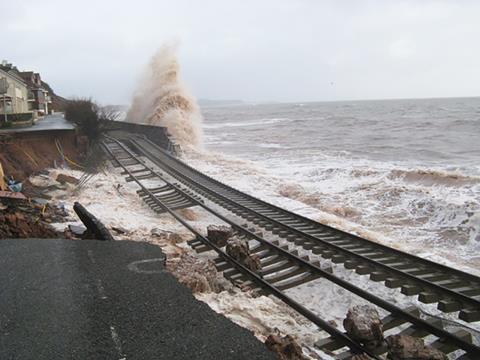
UK: Climate change could have a ‘significant and damaging’ impact on the rail network leading to a ‘dramatic increase’ in the cost of dealing with extreme weather unless pre-emptive action is taken, RSSB said when it released its ‘Tomorrow’s Railway & Climate Change Adaptation’ report on May 31.
The report looks at the impact of higher average temperatures, rising sea levels, more frequent floods and heat waves, wetter winters and dryer summers. Recommendations to improve resilience include improved mapping of vulnerable assets, accurate logging of the location of incidents and the weather, revising industry standards to take account of climate predictions, and developing a ‘journey availability’ metric to assess long-term availability across UK transport networks during extreme weather.
The project began in June 2012, funded by RSSB and Network Rail, overseen by RSSB, Network Rail and John Dora Consulting, It was supported by a consortium of Arup, the British Geological Survey, CIRIA, JBA Consulting, the Met Office, Transport Research Laboratory, University of Birmingham and University College London.
The study also found that some resilience projects fail to gain funding because the wider economic and social impact of disruption is not taken into account. The cost of the collapse of the railway on the sea wall at Dawlish in February 2014 was ‘far higher than just the bill for repairs and compensation payments’, commented Tim Armitage of Arup. ‘When you take into account the impact on local businesses and communities, the case for building alternative routes becomes much more compelling.’





































